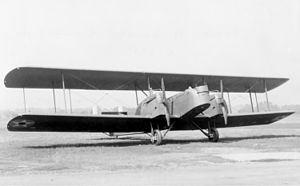| Elias XNBS-3 | |
|---|---|

| |
| Role | Night bomberType of aircraft |
| National origin | United States |
| Manufacturer | Elias |
| Primary user | United States Army Air Corps |
| Number built | 1 |
The Elias XNBS-3 was a 1920s prototype biplane bomber built by Elias for the United States Army Air Corps.
Development
The XNBS-3 was a large biplane bomber with a steel tube fuselage and powered by two 425 hp (317 kW) Liberty 12A piston engines. It had a conventional landing gear with a tailskid and a crew of four. The prototype was designated XNBS-3 (XNBS=prototype night bomber short distance). On 13 August 1924 Lieutenant John A. Macready test piloted the Elias XNBS-3 twin engine bomber for the United States Army Air Corps at McCook Field in Dayton, Ohio. The XNBS-3 had New York to Chicago non-stop range and five machine guns for defense. It was similar to the earlier Martin NBS-1 and was no real improvement, so it was not ordered into production.
Operators
Specifications
Data from National Museum of the United States Air Force
General characteristics
- Crew: four
- Length: 48 ft 5 in (14.76 m)
- Wingspan: 77 ft 6 in (23.63 m)
- Height: 16 ft 10 in (5.13 m)
- Gross weight: 14,427 lb (10,763 kg)
- Powerplant: 2 × Liberty 12A , 425 hp (317 kW) each
Performance
- Maximum speed: 101 mph (163 km/h, 88 kn)
- Range: 465 mi (748 km, 404 nmi)
- Service ceiling: 8,680 ft (2,650 m)
Armament
- 1692 lbs of bombs
- Five 0.30in machine-guns
See also
Aircraft of comparable role, configuration, and era
Related lists
References
Notes
- ^ Andrade 1979, p. 136
- "Elias Bomber". The Buffalo Times--Page 1. 14 Aug 1924. Retrieved 20 July 2020.
- ^ "Elias XNBS-3". National Museum of the United States Air Force. Archived from the original on 16 June 2012. Retrieved 11 June 2010.
Bibliography
- Andrade, John (1979). U.S.Military Aircraft Designations and Serials since 1909. Midland Counties Publications. ISBN 0-904597-22-9.
| USAAS bomber designations 1919–1924 | |
|---|---|
| Day bombardment | |
| Night bombardment, short-range | |
| Night bombardment, long-range | |